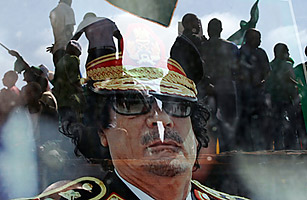
Muammar Gaddafi’s options for a peaceful exit may have finally run out. For the second time in seven weeks, South African President Jacob Zuma on Monday failed to persuade the Libyan leader to abandon his 42-year rule. Gaddafi’s refusal to heed the advice of longtime friends in the African Union raises the likelihood that his reign will end either with his indictment by the International Criminal Court in The Hague or with his death in a NATO air strike.
Zuma had previously visited Tripoli on April 10, failing on that occasion to persuade Gaddafi to accept an AU-brokered cease-fire deal. Seven weeks later, Gaddafi’s ability to dictate his terms has been hugely diminished, if not entirely smashed. Gone is the cocky, belligerent leader, whose thumping speeches were a regular feature for months on state-run Libya Television; his speech last February promising to smoke out the rebels “street by street” now seems like a relic from the past. Libyan officials announced last week that they wanted to discuss a cease-fire deal with rebels and a transition to democracy — but insisted that Gaddafi remain until a new government is in place, a nonstarter for NATO officials and Libyan opposition leaders.
Gaddafi’s military, although pummeled by NATO bombs, has lasted far longer than Western officials expected in March, when they launched their military campaign to save the rebels from slaughter. At the time, NATO strategists had expected Gaddafi’s forces to crumble quickly under their vastly superior firepower. But Gaddafi has survived by maintaining his grip, however tenuous, on Libya’s political and economic powerhouse, Tripoli. Capturing the city remains the biggest hurdle facing the rebels.
Although Gaddafi clings to power, NATO strikes are believed to have crippled his ability to plan any serious military maneuvers — commanders no longer use mobile telephones, and roads are too dangerous to travel on, making communication by courier difficult. That, says Richard Dalton, the former British ambassador to Libya and associate fellow at the London think tank Chatham House, may leave Gaddafi little ability to exercise any day-to-day management over his forces — a deeply disturbing situation for a man who for decades commanded absolute authority over civilians and military alike. “Gaddafi is finding it more and more difficult to maintain communication with his military,” he says. “If NATO has succeeded in taking down secure military communications, that would also increase his exposure.”